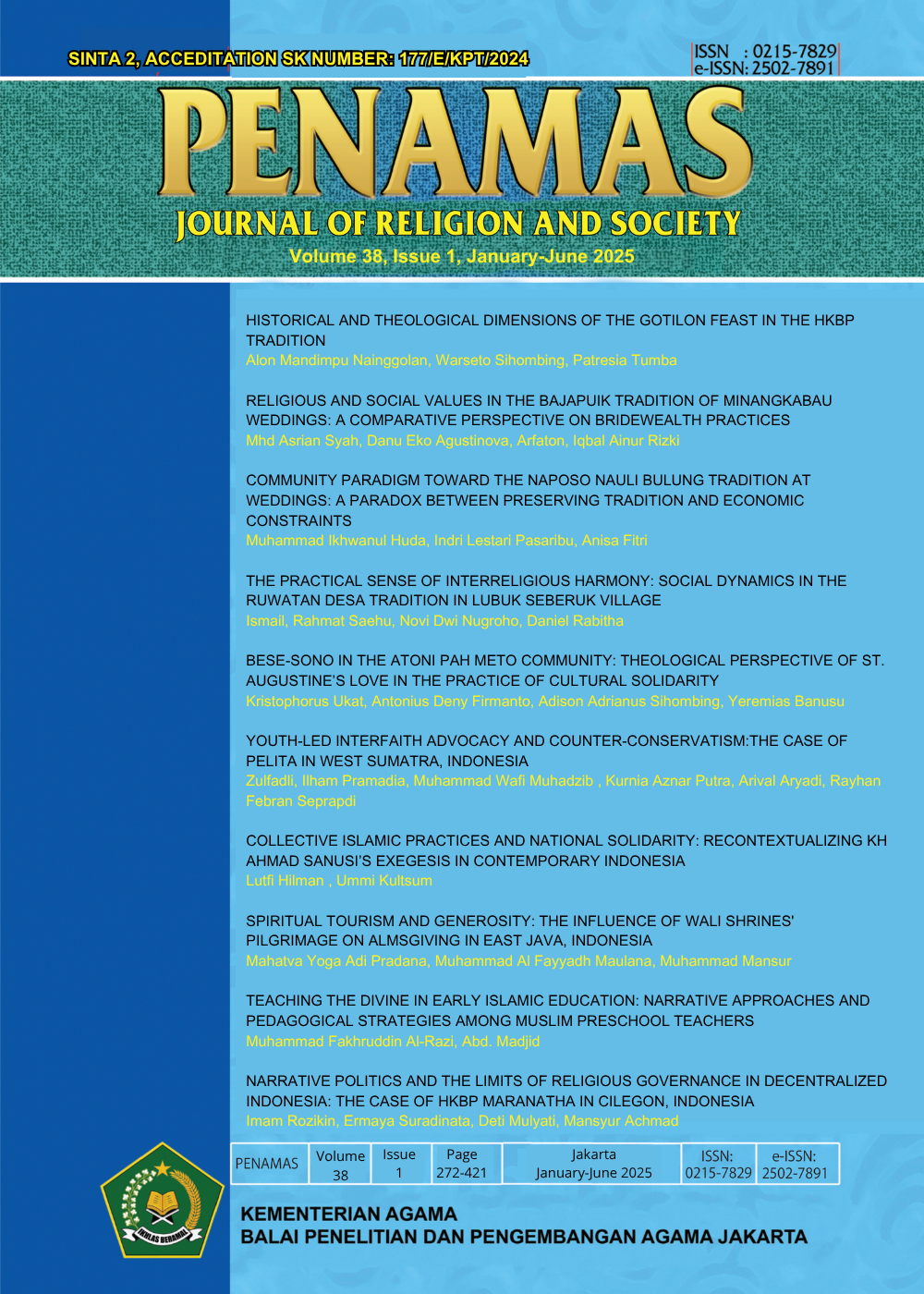COMMUNITY PARADIGM TOWARD THE NAPOSO NAULI BULUNG TRADITION AT WEDDINGS: A PARADOX BETWEEN PRESERVING TRADITION AND ECONOMIC CONSTRAINTS
DOI:
https://doi.org/10.31330/penamas.v38i1.892Keywords:
Naposo Nauli Bulung, Wedding Tradition, Economic Burden, Structural Functional, South TapanuliAbstract
This study explores the tradition of Naposo Nauli Bulung (NNB) in the customary wedding practices of Kampung Hasobe, South Tapanuli, focusing on its social role and economic impact, particularly regarding the financial burden associated with components such as Uang Tunda, Uang Pataruhon, and Uang Golap. Unlike previous studies that primarily emphasize cultural aspects, this research offers an integrated analysis of both the social function and economic pressures embedded within the tradition. Employing a qualitative case study design, data were collected through in-depth interviews and participatory observation involving six informants, consisting of household heads and active NNB members. The findings reveal that NNB significantly contributes to strengthening social cohesion, fostering collective solidarity, and sustainably reproducing local cultural values. However, the tradition also imposes considerable financial strain, especially on lower-middle-income families, potentially leading to social exclusion. These findings are analyzed through the lens of structural functionalism theory, emphasizing the need to balance the preservation of traditional values with the community’s capacity to adapt to evolving socioeconomic conditions. The study highlights the urgency of reforming the implementation structure of NNB to make it more adaptive and inclusive. It recommends fostering intergenerational dialogue, developing transparent cost guidelines, and actively involving the younger generation in cultural preservation efforts as a strategy for social regeneration. Conducted throughout 2024, this research contributes to the discourse on local cultural practices by integrating economic considerations and community-based social development issues.
References
Abdoeh, N. M. (2019). Hukum Keluarga Islam Di Republik Ghana (Antara Mempertahankan Eksistensi Agama Dan Tekanan Adat). Jurnal Al-Qadau: Peradilan Dan Hukum Keluarga Islam, 6(2), 147–166. https://doi.org/10.24252/al-qadau.v6i2.10695
Abdul Aziz, N. A., Mohd Ariffin, N. F., Ismail, N. A., & Alias, A. (2023). Community Participation in the Importance of Living Heritage Conservation and Its Relationships with the Community-Based Education Model towards Creating a Sustainable Community in Melaka UNESCO World Heritage Site. Sustainability (Switzerland), 15(3). https://doi.org/10.3390/su15031935
Albers, N. D., Wren, A. O., Knotts, T. L., & Chupp, M. G. (2021). Consumer Perceptions and Pricing Practices for Weddings. Journal of Consumer Policy, 44(3), 407–426. https://doi.org/10.1007/s10603-021-09488-y
Bukhari, A. B., & Arifin, A. B. (2025). Tingginya Biaya Pernikahan Dan Pengaruhnya Terhadap Keputusan Menikah Milenial. Jurnal Kajian Hukum Keluarga Islam, 7(1), 13–26.
Creswell, J. W. (1998). Qualitative Inquiry and Research Design; Choosing among Five Traditions. Sage Publications.
Dilinar Adlin, & Nugrahaningsih, R. H. D. (2019). History Analysis, Form of Presentation, and Function Tortor Naposo Nauli Bulung on Batak Mandailing Communities. Britain International of Linguistics Arts and Education (BIoLAE) Journal, 1(2), 296–302. https://doi.org/10.33258/biolae.v1i2.97
Edlira, M., Ermiona, B., Silvja, Ç., & Diana, S. (2021). Assessing Youth Engagement in the Preservation and Promotion of Culture Heritage: A Case Study in Korça City, Albania. Quaestiones Geographicae, 40(1), 109–125. https://doi.org/10.2478/quageo-2021-0009
Effendi, H., Nugraha, M. A., Aisyah, S., & Muspardi. (2019). Transformasi Karakter Naposo Nauli Bulungmelalui Penguatan Fungsi Sopo Godang Pada Era Digital. Jurnal Education and Development Institut, 7(1), 51–57.
Harahap, S. A. (2022). the Role of Naposo Nauli Bulung in Preserving Batak Mandailing Culture in Bangai Village, Torgamba District, South Labuhanbatu Regency. JHSS (Journal of Humanities and Social Studies), 6(3), 368–374. https://doi.org/10.33751/jhss.v6i3.6795
Hartati, H. (2016). Tradisi Menari Dalam Upacara Pernikahan Masyarakat Bengkulu Selatan. Ekspresi Seni, 18(1). https://doi.org/10.26887/ekse.v18i1.89
Hasibuan, A., & Harahap, D. (2021). Problematika dan Strategi Naposo Nauli Bulung (NNB) dalam Kegiatan Sosial Keagamaan di Kota Padangsidimpuan. Jurnal At-Taghyir: Jurnal Dakwah Dan Pengembangan Masyarakat Desa, 4(1), 45–68. https://doi.org/10.24952/taghyir.v4i1.4514
Kurnia, H., Dasar, F. L., & Kusumawati, I. (2022). Nilai-nilai karakter budaya Belis dalam perkawinan adat masyarakat Desa Benteng Tado Kabupaten Manggarai Barat Nusa Tenggara Timur. Satwika : Kajian Ilmu Budaya Dan Perubahan Sosial, 6(2), 311–322. https://doi.org/10.22219/satwika.v6i2.22300
Kusor. (2021). The Role Of Naposo Nauli Bulung (NNB) Toward Security Development In The Village Of Panggorengan. Jurnal Darma Agung, 29(3), 491–498. https://jurnal.darmaagung.ac.id/index.php/jurnaluda/article/view/3202
Merton, R. K. (1968). Social Theory and Social Structure. The Free Press.
Muzainah, G. (2019). Baantar Jujuran Dalam Perkawinan Adat Masyarakat Banjar. Jurnal Al-Insyiroh: Jurnal Studi Keislaman, 5(2), 10–33. https://jurnal.staidhi.com/index.php/alinsyiroh/article/view/158
Parsons, T. (1951). The Social System. Routledge & Kegan Paul.
Pasaribu, I. L. (2025a). Wawancara dengan Ali Akbar, warga Kampung Hasobe, Tapanuli Selatan.
Pasaribu, I. L. (2025b). Wawancara dengan Kardi Pasaribu, salah satu kepala keluarga di di Kampung Hasobe.
Pasaribu, I. L. (2025c). Wawancara dengan Mulla Harahap, salah satu kepala keluarga di di Kampung Hasobe.
Pasaribu, I. L. (2025d). Wawancara dengan Nursakinah pasaribu, Anggota Naposo Nauli Bulung.
Pasaribu, I. L. (2025e). Wawancara dengan Pilihan Pasaribu, salah satu kepala keluarga di Kampung Hasobe, Tapanuli Selatan.
Pasaribu, I. L. (2025f). Wawancara dengan Rudi Harahap, warga di di Kampung Hasobe.
Putra, D., Hamid, A., Nst, A. M., & Edi, S. (2023). Character Transformation of Naposo Nauli Bulung in Religious Practice in South Tapanuli Regency. Tsaqafah, 19(2), 353–378. https://doi.org/10.21111/tsaqafah.v19i2.9206
Regensy, M. N., & Kadir, T. H. (2024). Makna Tor - Tor Naposo Nauli Bulung pada Pesta Perkawinan di Kotanopan Kabupaten Mandailing Natal The Meaning of Tor - Tor Naposo Nauli Bulung at a Wedding Party in Kotanopan ,. Jurnal Sendratasik, 13(3), 1–13.
Renaldi Randi. (2022). Nilai Gotong Royong Dan Tradisi Gawe Perkawinan Melayu Iras. JPKN: Jurnal Pendidikan Kewarganegaraan, 6(5), 267–279.
Setiawan, E. (2024). Kearifan Lokal Tradisi Rewang Dalam Membangun Solidaritas Masyarakat Perdesaan Jawa. Publicio: Jurnal Ilmiah Politik, Kebijakan Dan Sosial, 6(1), 48–58. https://doi.org/10.51747/publicio.v6i1.1867
Siregar, A. P., & Mahariah, M. (2023). Naposo Nauli Bulung: Existence, Role and Continuity of Islamic Education Institutions Based on Local Wisdom in Instilling Islamic Education Values in the Community. Al-Mudarris (Jurnal Ilmiah Pendidikan Islam), 6(1), 9–26. https://doi.org/10.23971/mdr.v6i1.8018
Zhang, Y., Kaya, D. I., Wesemael, P. van, & Colenbrander, B. J. (2024). Youth participation in cultural heritage management: a conceptual framework. International Journal of Heritage Studies, 30(1). https://doi.org/https://doi.org/10.1080/13527258.2023.2275261
Downloads
Published
Issue
Section
License
Copyright (c) 2025 Penamas

This work is licensed under a Creative Commons Attribution-NonCommercial-ShareAlike 4.0 International License.









